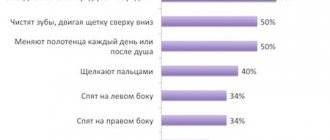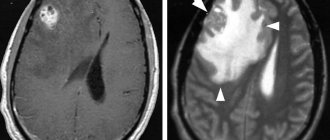Mental health is a very sensitive topic. Clinical manifestations of mental disorders depend on the age of the child and the influence of certain factors. Often, due to fear for future changes in their own life, parents do not want to notice some problems with the psyche of their child.
Many people are afraid to catch the sidelong glances of their neighbors, feel the pity of their friends, or change their usual life order. But the child has the right to qualified, timely assistance from a doctor, which will help alleviate his condition, and in the early stages of certain diseases, cure a mental disorder of one spectrum or another.
One of the complex mental illnesses is childhood psychosis. This disease is understood as an acute condition of a child or a teenager, which manifests itself in his incorrect perception of reality, his inability to distinguish the real from the imaginary, and his inability to really understand what is happening.
Features of childhood psychoses
Mental disorders and psychoses in children are not diagnosed as often as in adult men and women.
Mental disorders come in different types and forms, but no matter how the disorder manifests itself, no matter what symptoms the disease has, psychosis significantly complicates the life of the child and his parents, prevents him from thinking correctly, controlling actions, and building adequate parallels in relation to established social norms. Childhood psychotic disorders are characterized by:
- Delayed development of skills and intelligence. This feature appears in most cases. But there are diseases, for example, autism, during which the child has bright and advanced abilities in some area of activity. Experts say that in the early stages, mental disorders in children are difficult to distinguish from simple developmental delays, and therefore it is impossible to recognize a mental disorder.
- Problems with social adjustment.
- Violation of interpersonal relationships.
- A sublime and special attitude towards inanimate objects.
- Supporting monotony, not accepting changes in life.
Childhood psychosis has different forms and manifestations, which is why it is difficult to diagnose and treat.
Causes
It is no coincidence that the crisis period for seven-year-olds coincides with school adaptation. Internal changes in the psyche are mainly caused by a change in the child’s social role, new types of activities and responsibilities. In general, the causes of the crisis can be divided into three groups:
- Acceptance of a new social role. The child takes an important social role and becomes a schoolchild. Along with the role, he also takes on new responsibilities: studying, sitting through lessons, following a routine, doing homework. At the same time, the baby becomes a classmate, a participant in joint learning and games, friendship, sympathy, and competition. Demands on him are growing, and he, in turn, begins to make claims to others.
- Loss of childish spontaneity. The immediate situational reactions that are typical for children are quickly lost due to the need to take on a new social role. Therefore, the attributes of “adulthood” suddenly appear: independence, decision-making, assessment of situations. The reasons for a child’s actions are not always clear; actions may seem illogical, since he hides their motives.
- Awareness of internal experiences. The baby begins to become aware of his inner self and explore his own emotions. In addition to physiological needs, he begins to feel mental needs. Understands that good grades are needed in order not to disappoint parents, to receive praise from the teacher, and to assert oneself among peers. But everything is not so simple. After all, on the one hand, you want to go for a walk, but on the other, you need to live up to the expectations of your elders. The constant need to choose also becomes a serious cause of identity crisis.
Why are children susceptible to mental disorders?
Multiple causes contribute to the development of mental disorders in children. Psychiatrists identify whole groups of factors:
- genetic;
- biological;
- sociopsychological;
- psychological.
The most important provoking factor is a genetic predisposition to mental disorders. Other reasons include:
- problems with intelligence (mental retardation and others like it);
- organic brain damage;
- incompatibility of the temperament of the baby and the parent;
- family discord;
- conflicts between parents;
- events that left psychological trauma;
- medications that can cause a psychotic state;
- high fever, which may cause hallucinations or delusions;
- neuroinfections.
To date, all possible causes have not been fully studied, but studies have confirmed that children with schizophrenia almost always have signs of organic brain disorders, and patients with autism are often diagnosed with cerebral insufficiency, which is explained by hereditary causes or injuries during childbirth .
Psychosis in young children can occur due to parental divorce.
At-risk groups
Thus, children are at risk:
- one of whose parents had or has mental disorders;
- who are brought up in a family where conflicts constantly arise between parents;
- have had neuroinfections;
- those who have suffered psychological trauma;
- whose blood relatives have mental illnesses, and the closer the degree of relationship, the greater the risk of developing the disease.
Duration
The crisis does not begin exactly when the child turns seven. Its onset cannot be attributed to the first day of school. In reality, everything is much more complicated.
Preparation for school begins early, and by the end of kindergarten, classes become more difficult and teachers become more demanding. The child feels changes and increasing pressure, so the first mental preconditions may arise at the age of five or six years. However, there is another category of children who begin to realize the severity of the new burden after school begins.
Everyone comes to a state of crisis when the psyche gives an adequate response to the difficulties that have arisen. Symptoms develop slowly, and the child copes with the new responsibility also gradually. Psychologists say that this age crisis lasts about 6-9 months. But the duration of the transitional stage in growing up depends on the individual characteristics of the baby.
Types of psychotic disorders among children
Children's mental illnesses are divided according to certain criteria. Depending on age, there are:
- early psychosis;
- late psychosis.
The first type includes patients with mental disorders of infancy (up to one year), preschool (from 2 to 6 years) and early school age (from 6-8). The second type includes patients of pre-adolescence (8-11) and adolescence (12-15).
Depending on the cause of the disease, psychosis can be:
- exogenous – disorders caused by exposure to external factors;
- endogenous – disorders provoked by the internal characteristics of the body.
Depending on the type of course, psychoses can be:
- reactive , which arose as a result of prolonged psychological trauma;
- acute – arising instantly and unexpectedly.
A type of psychotic disorder is affective disorder. Depending on the nature of the course and symptoms of affect disorders, there are:
- depressed;
- manic;
- schizoaffective;
- organic.
Symptoms depending on the form of failure
Different symptoms of mental illness are justified by different forms of the disease. Common symptoms of the disease are:
- hallucinations - the baby sees, hears, feels something that is not really there;
- delusion – a person sees the existing situation in his own incorrect interpretation;
- decreased clarity of consciousness, difficulty in orientation in space;
- passivity, lack of initiative;
- aggressiveness, irritability, rudeness;
- obsession syndrome.
- deviations associated with thinking.
Psychogenic shock often occurs in children and adolescents. Reactive psychosis occurs as a result of psychological trauma.
This form of psychosis has signs and symptoms that distinguish it from other mental spectrum disorders in children:
- its reason is deep emotional shock;
- reversibility - symptoms weaken over time;
- symptoms depend on the nature of the injury.
Early age
At an early age, mental health problems manifest themselves in autistic behavior in the child. The baby does not smile or in any way show joy on his face. Up to a year, the disorder is detected in the absence of humming, babbling, and clapping. The baby does not react to objects, people, or parents.
Age crises, during which children are most susceptible to mental disorders from 3 to 4 years, from 5 to 7, from 12 to 18 years.
Early mental disorders manifest themselves in:
- frustration;
- capriciousness, disobedience;
- increased fatigue;
- irritability;
- lack of communication;
- lack of emotional contact.
Later ages up to adolescence
Mental problems in a 5-year-old child should worry parents if the child loses already acquired skills, communicates little, does not want to play role-playing games, and does not take care of his appearance.
At the age of 7, the child becomes mentally unstable, he has an appetite disorder, unnecessary fears appear, his performance decreases, and rapid fatigue appears.
At the age of 12-18, parents need to pay attention to their teenager if he or she develops:
- sudden mood swings;
- melancholy, anxiety;
- aggressiveness, conflict;
- negativism, inconsistency;
- a combination of the incompatible: irritability with acute shyness, sensitivity with callousness, the desire for complete independence with the desire to always be close to mom;
- schizoid;
- refusal of accepted rules;
- penchant for philosophy and extreme positions;
- intolerance of guardianship.
More painful signs of psychosis in older children include:
- suicide attempts or self-harm;
- causeless fear, which is accompanied by palpitations and rapid breathing;
- desire to harm someone, cruelty towards others;
- refusal to eat, taking laxative pills, strong desire to lose weight;
- increased feeling of anxiety that interferes with life;
- inability to persevere;
- taking drugs or alcohol;
- constant mood swings;
- bad behavior.
Signs of a depressive phase
Bipolar disorder begins in most patients without noticeable bright manifestations.
In a typical case of MDP, there are subtle fluctuations in the background mood with cycles of several days or weeks. Researchers of the problem emphasize that the unfavorable course of bipolar disorder is the onset of the disorder from the first depressive episode. During the depressive phase, 89% of suicides or suicide attempts occur. Depression occurs when high productivity of mental processes is abruptly replaced by its decline. Specific manifestations of the phase:
- severely depressed mood;
- slowing down the thought process;
- slower speech motor activity;
- decreased or complete absence of appetite, perverted taste sensitivity;
- weight loss;
- prostration;
- in women - problems with menstruation;
- mothers have problems with maternal instinct;
- lack of sexual desires;
- melancholy, which is felt physically as heaviness in the chest area;
- attacks of tachycardia, constipation, mydriasis (dilated pupils of the eyes);
- self-flagellation, guilt;
- increased anxiety;
- cognitive impairment.
Depression sometimes takes on an endogenous form - due to the biological nature of the disorder, not only mental, but also somatic and endocrine disorders occur.
Sometimes an “atypical” course of depression develops—increased appetite, hypersomnia. There is also a hypochondriacal type of disorder - in this case, obsessive hypochondriacal beliefs with an affective overtone are noted. With the delusional type of progression, “Cotard's syndrome” is present - in addition to anxiety, delusional beliefs of a fantastic nature are observed. With agitation depression there is noticeable nervous overexcitation. With the asthenic variant, the patient experiences a loss of the ability to feel anything.
Patients experience unmotivated sadness and a feeling of hopelessness especially acutely - from several hours to several days without the ability to be distracted by anything else. The person withdraws into himself and stops contacting family members and friends. Interest in those activities and things that previously had interests is completely lost. Low ability to learn new things. Appetite may be uncontrollable or absent.
Fatigue and lack of energy are felt around the clock. Sleep is interrupted, and episodes of awakening occur frequently, especially in the early morning. After sleep, a person does not feel rested. Memory problems arise and concentration is poor. Thoughts about suicide appear - a person experiences a clear conviction that life has no meaning and will never bring pleasure. With parasuicidal behavior, a syndrome of “tunnel thinking” is observed.
The depressive phase is very dangerous due to the high level of suicidal tendencies, parasuicides, and auto-aggressive acts. It is recommended to hospitalize the person for subsequent treatment in a hospital setting. 24-hour monitoring of the patient’s condition and indicators is important.
Diagnostic criteria and methods
Despite the proposed list of signs of psychosis, no parent can definitely and accurately diagnose it on their own. First of all, parents should take their child to a psychotherapist. But even after the first appointment with a professional, it is too early to talk about mental personality disorders. A small patient should be examined by the following doctors:
- neurologist;
- ENT;
- speech therapist;
- psychiatrist;
- a doctor who specializes in developmental diseases.
Sometimes the patient is admitted to a hospital for examination and necessary procedures and tests.
Providing professional assistance
Short-term attacks of psychosis in a child disappear immediately after their cause disappears. More severe diseases require long-term therapy, often in an inpatient hospital setting. Specialists use the same drugs to treat childhood psychosis as for adults, only in appropriate doses.
Treatment of psychoses and psychotic spectrum disorders in children involves:
- prescription of antipsychotics, antidepressants, stimulants, etc.;
- consultations with relevant specialists;
- family therapy;
- group and individual psychotherapy;
- attention and love of parents.
If parents were able to identify a mental disorder in their child in time, then several consultations with a psychiatrist or psychologist are usually sufficient to improve the condition. But there are cases that require long-term treatment and being under the supervision of doctors.
Psychological failure in a child, which is associated with his physical condition, is cured immediately after the disappearance of the underlying disease. If the illness was provoked by a stressful situation experienced, then even after the condition improves, the baby requires special treatment and consultations with a psychotherapist.
In extreme cases, when severe aggression occurs, the child may be prescribed tranquilizers. But for the treatment of children, the use of heavy psychotropic drugs is used only in extreme cases.
In most cases, psychoses experienced in childhood do not return in adulthood in the absence of provoking situations. Parents of recovering children must fully adhere to the daily routine, do not forget about daily walks, a balanced diet and, if necessary, take care of taking medications in a timely manner.
The baby cannot be left unattended. If there is the slightest disturbance in his mental state, it is necessary to seek help from a specialist who will help him cope with the problem that has arisen.
To treat and avoid consequences for the child’s psyche in the future, it is necessary to follow all recommendations of specialists.
Recommendations for parents
Every parent concerned about the mental health of their child should remember:
- do not forget that psychosis is a disease that needs treatment;
- treatment should be started in a timely manner, and the visit to specialists should not be delayed;
- it is necessary to consult with several specialists, because proper treatment is the key to success;
- for the treatment and prevention of the disease, the support of family and friends is important;
- goodwill towards the patient speeds up the treatment process and ensures lasting results after treatment;
- after treatment, the baby must be returned to a normal environment and make plans for the future;
- it is necessary to create a calm atmosphere in the family: do not shout, do not practice physical or moral violence;
- take care of the baby’s physical health;
- avoid stress.
Love and care are what any person needs, especially a small and defenseless one.
Consequences
If parents help overcome the crisis period, the child will successfully overcome an important turning point, form new correct mental reactions, and acquire social skills and roles. This will help him:
- to form a responsible attitude towards learning, a correct understanding and perception of the educational process;
- gain new emotional skills;
- realize your place in society, take the desired role among classmates;
- find new hobbies and interests.
If parents suppress manifestations of social development and complicate the situation with improper behavior, conflicts or problems within the family, this can cause serious damage to the child’s psyche. The child can:
- lose interest in studying;
- take any criticism too seriously;
- lower self-esteem;
- develop complexes in yourself;
- show aggression, cruelty;
- withdraw into oneself, fail to adapt to the school team;
- lose trust in parents, lose close connection with them.
It is important to remember that a crisis is a pattern that opens up new prospects for growth and development. The main task of adults is to help the child cope with a difficult situation, to show sensitivity, patience and attention. Only in this way will a newly graduated student be able to overcome all difficulties and make an important leap in mental growth.









